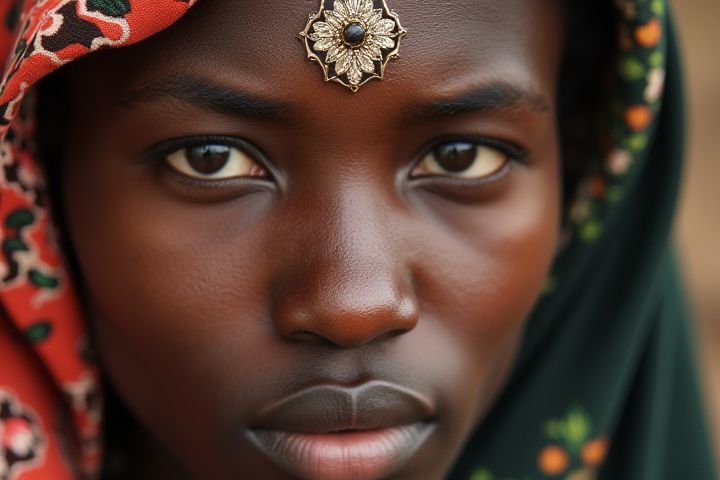
Nigeria showcases a complex tapestry of religious dynamics, primarily driven by Islam and Christianity, which together shape the country's cultural and social landscapes. The North predominantly adheres to Islam, while the South leans heavily toward Christianity, resulting in religious plurality often marked by tension and conflict. In regions like the Middle Belt, the intermingling of these faiths leads to unique syncretic practices and local beliefs. The influence of religion extends beyond personal faith into political affiliations, impacting governance, law, and community relations, frequently exacerbating socio-economic inequalities. Understanding these dynamics is essential for grasping Nigeria's rich history, contemporary issues, and the challenges facing its path toward unity and peace.
Diverse religious landscape
Nigeria's religious landscape is marked by a rich tapestry of beliefs, primarily dominated by Islam and Christianity, alongside traditional African religions. This diversity shapes cultural practices, ceremonies, and daily life, influencing social interactions and political structures. The northern region predominantly practices Islam, while the southern areas are largely Christian, leading to a complex interplay of faiths. Understanding these dynamics is essential for appreciating Nigeria's socio-political climate, economic behaviors, and communal relationships.
Predominantly Islam in the North
Nigeria's religious landscape is marked by a significant predominance of Islam in the northern regions, where the majority of the population identifies as Muslim. This area is characterized by the influence of historical empires, such as the Sokoto Caliphate, which have shaped Islamic practices and governance. In contrast to the predominantly Christian south, northern Nigeria navigates complex interfaith relations, often marked by sociopolitical tensions. Understanding these dynamics is crucial for grasping the broader implications on national cohesion, governance, and community relations within the country.
Predominantly Christianity in the South
In Nigeria, the southern region is predominantly Christian, with major denominations including Roman Catholicism, Anglicanism, and various Pentecostal churches. This religious landscape significantly influences cultural practices, social values, and political affiliations in the area. Strong community ties often revolve around church activities, fostering a sense of belonging and mutual support among congregants. You'll find that these religious dynamics play a crucial role in shaping interfaith relations and addressing local socio-economic issues.
Indigenous beliefs influence
Religious dynamics in Nigeria are profoundly shaped by Indigenous beliefs that intertwine with the practices of Christianity and Islam. Traditional worship systems, such as those centered around ancestral spirits and deities, significantly influence contemporary religious expressions and community identities. Festivals, rituals, and healing practices rooted in these Indigenous traditions continue to coexist alongside mainstream religions, thereby enriching the cultural tapestry of Nigeria. Understanding these dynamics is essential for appreciating the unique interplay of faith and identity in Nigerian society.
Religious coexistence challenges
Nigeria's religious landscape is marked by a complex interplay of Islam and Christianity, with significant cultural implications. Regions such as the North, predominantly Muslim, often experience tensions with the Christian-majority South, particularly in urban areas where diverse faiths intersect. The ongoing challenges of religious coexistence include violent conflicts, extremism, and interfaith dialogue obstacles, impacting community development and national stability. To foster peace, initiatives aimed at promoting mutual respect and understanding among religious groups are essential for a harmonious society.
Political-religious intersections
Nigeria's religious dynamics are significantly shaped by the interplay between political and religious institutions, reflecting a complex relationship that often influences governance and societal cohesion. The country is predominantly divided between Islam in the northern regions and Christianity in the south, leading to a diverse tapestry of beliefs that impact political affiliations and electoral processes. Religious leaders and organizations frequently play pivotal roles in mobilizing support for political candidates, thereby wielding considerable influence over public opinion and policy-making. As a result, understanding the intersection of religion and politics in Nigeria is essential for grasping the nation's socio-political landscape and addressing the challenges of interfaith relations and national unity.
Role of religious leaders
Religious leaders in Nigeria play a pivotal role in shaping community beliefs and social norms, influencing both spiritual guidance and socio-political issues. These leaders, who often represent diverse faiths such as Islam, Christianity, and indigenous belief systems, act as mediators during conflicts and advocates for social justice. Their ability to mobilize congregations can lead to significant societal change, affecting everything from education to health initiatives. In your interaction with these leaders, understanding their impact on local dynamics can enhance community engagement and promote dialogue across different faiths.
Interfaith dialogue efforts
Interfaith dialogue efforts in Nigeria have become crucial in fostering social cohesion amidst the nation's diverse religious landscape, primarily dominated by Christianity and Islam. Organizations like the Interfaith Mediation Center (IMC) and the Nigeria Interfaith Action Association (NIFAA) play pivotal roles in facilitating conversations that promote understanding and tolerance between different faith communities. These initiatives seek to address the root causes of conflict, such as socio-economic disparities and political tensions, by encouraging collaborative projects that benefit both Muslim and Christian communities. Engaging in these dialogues not only enhances mutual respect among diverse groups but also contributes to the overall stability and peace in Nigeria.
Ethno-religious conflicts
Nigeria's religious landscape is deeply intertwined with its ethnic diversity, leading to significant ethno-religious conflicts, primarily between the predominantly Muslim north and the largely Christian south. These tensions often manifest in violent confrontations, driven by competition for resources, political power, and social identity, impacting community cohesion. The influence of extremist groups, such as Boko Haram, exacerbates these conflicts, targeting individuals based on their religious affiliation and complicating peace efforts. Your understanding of Nigeria's ethno-religious dynamics is crucial for grasping the complexities of its societal challenges and the ongoing need for dialogue and reconciliation.
Constitutionally secular state
Nigeria operates as a constitutionally secular state, with its diverse religious landscape notably dominated by Islam and Christianity. This constitutional principle is essential in promoting tolerance, though tensions occasionally arise, particularly in regions where one faith significantly outnumbers the other. Local governance structures often reflect these religious affiliations, influencing policy-making and community relations. Understanding these dynamics is crucial for fostering peaceful coexistence and recognizing the role of religion in shaping Nigeria's social fabric.
